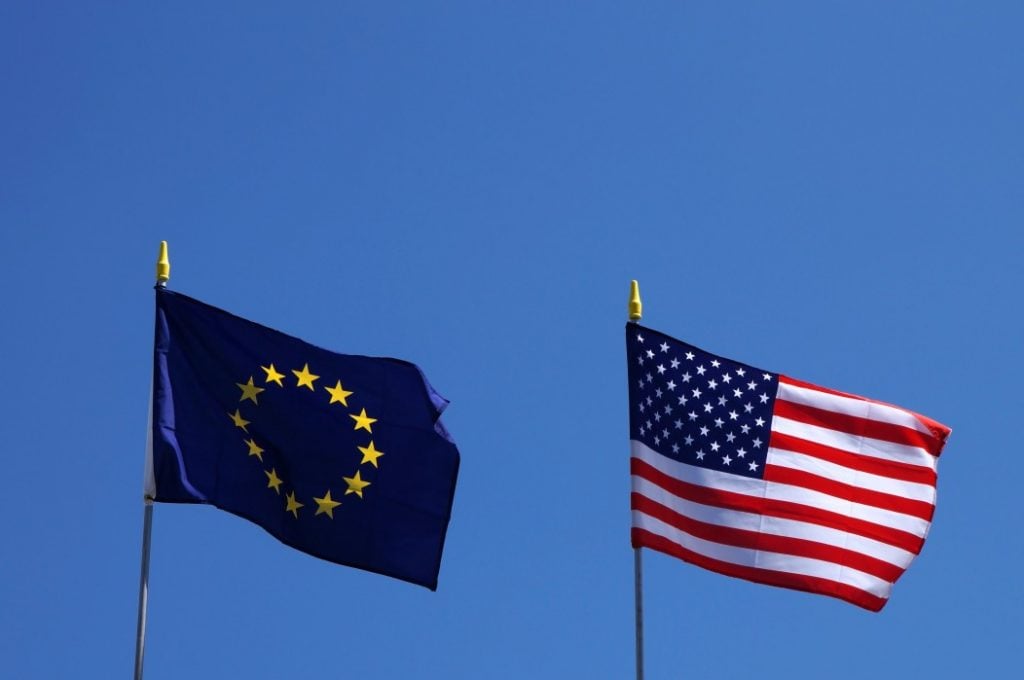Europe Takes the Lead in Crypto as U.S. Stalls on Regulation
22.06.2025 22:00 2 min. read Alexander Stefanov
Europe is emerging as the new global crypto hub, propelled by its MiCA regulatory framework, which is attracting investors and platforms alike.
With clear rules now in place, digital asset activity across the continent has surged, while the U.S. struggles with lingering legal uncertainty despite pro-crypto rhetoric from its leadership.
Crypto exchange Paybis reported a 70% increase in trading volume from European users in Q1 2025, right after MiCA came into effect. In contrast, American activity has slowed, with platforms like Robinhood seeing crypto volumes tumble by over a third and retail interest on Coinbase dropping sharply since 2021.
The main draw for companies and users is MiCA’s passporting regime—once a crypto firm secures approval in one EU state, it can operate across the bloc. This uniform licensing has led firms like Coinbase, OKX, and Crypto.com to obtain authorization under the framework, confident that their services now have continent-wide coverage.
Investors are responding positively. France, with its existing crypto regulation under the PACTE law, has seen activity spike over 170%, while Germany is boosting its institutional infrastructure. Other countries like the Netherlands and Lithuania are also carving out niches under MiCA, from payments to compliance.
Meanwhile, U.S. firms face ongoing confusion. Fragmented licensing requirements, unresolved lawsuits, and unclear federal rules are making the market difficult to navigate. Even with President Trump’s supportive stance, the regulatory vacuum remains a deterrent. A pending bill, the GENIUS Act, could shift that narrative by introducing national rules and stablecoin definitions—possibly unlocking the same kind of momentum Europe is now enjoying.
-
1
Here is When the U.S. House Will Vote on Key Crypto Bills
04.07.2025 12:00 2 min. read -
2
U.S. Crypto Investors Hit by IRS Letter Surge as Tax Crackdown Looms
29.06.2025 11:00 3 min. read -
3
Ripple Drops Cross-Appeal, Moves to End SEC Case “Once and for All”
28.06.2025 12:30 2 min. read -
4
Europe’s Largest Euro-Denominated Spot Crypto Exchange Secures License Under MiCA
29.06.2025 12:00 2 min. read -
5
SEC Approves Grayscale ETF Tracking Top Five Cryptocurrencies
02.07.2025 9:06 1 min. read
Senate Confirms Crypto-Linked Nominee Jonathan Gould to Head OCC
The U.S. Senate has confirmed Jonathan Gould as the next head of the Office of the Comptroller of the Currency (OCC), moving his nomination to President Donald Trump for final approval.
Australia Tests CBDCs in 24 Separate Real-World Finance Use Cases
Australia is stepping up its digital currency efforts with the next phase of Project Acacia, a pilot focused on testing central bank digital currency (CBDC) and tokenized finance in real-world applications.
U.S. Treasury Eliminates Crypto Reporting Rule Targeting Decentralized Exchanges
According to Bloomberg the U.S. Treasury Department has officially eliminated a controversial crypto reporting requirement that targeted decentralized exchanges.
U.S. Lawmakers Target El Salvador With Crypto Sanctions Plan
Three Democratic senators—Chris Van Hollen, Tim Kaine, and Alex Padilla—unveiled a bill aiming to penalize El Salvador’s President Nayib Bukele and his allies.
-
1
Here is When the U.S. House Will Vote on Key Crypto Bills
04.07.2025 12:00 2 min. read -
2
U.S. Crypto Investors Hit by IRS Letter Surge as Tax Crackdown Looms
29.06.2025 11:00 3 min. read -
3
Ripple Drops Cross-Appeal, Moves to End SEC Case “Once and for All”
28.06.2025 12:30 2 min. read -
4
Europe’s Largest Euro-Denominated Spot Crypto Exchange Secures License Under MiCA
29.06.2025 12:00 2 min. read -
5
SEC Approves Grayscale ETF Tracking Top Five Cryptocurrencies
02.07.2025 9:06 1 min. read


